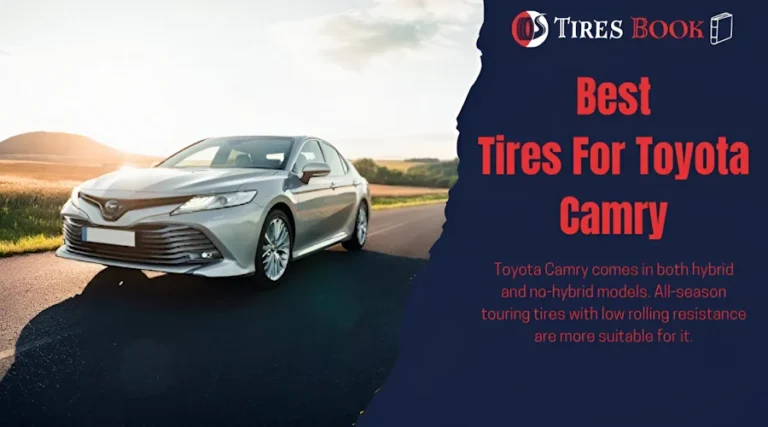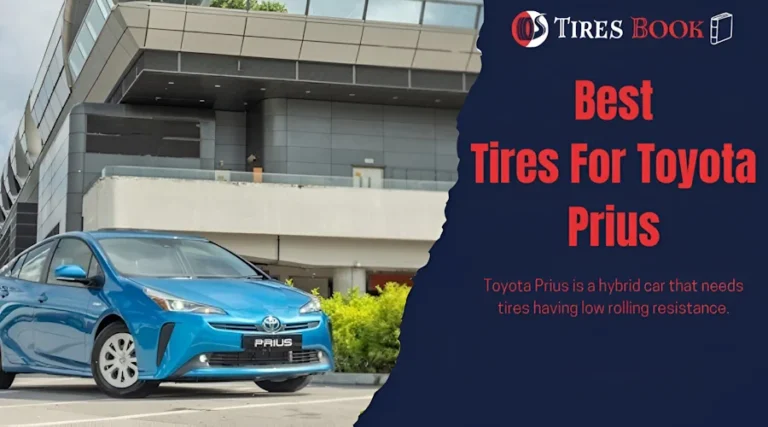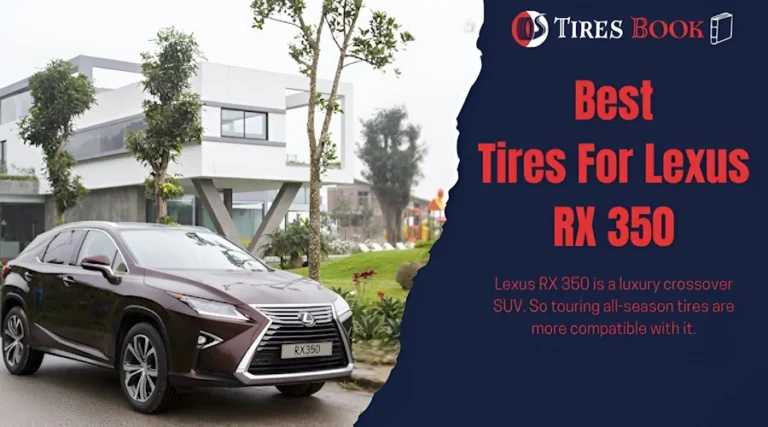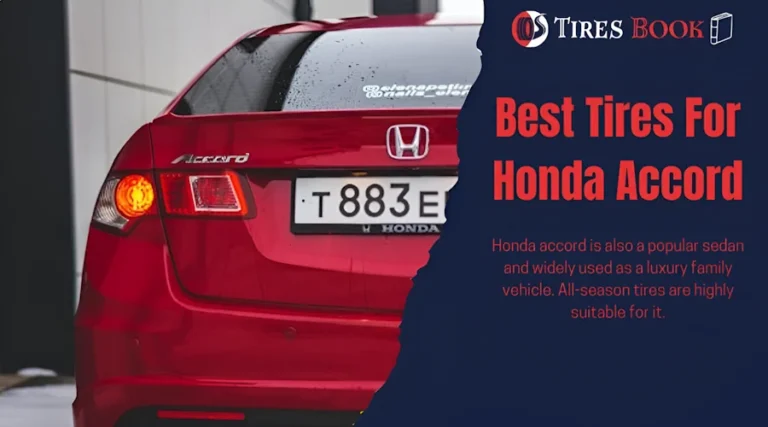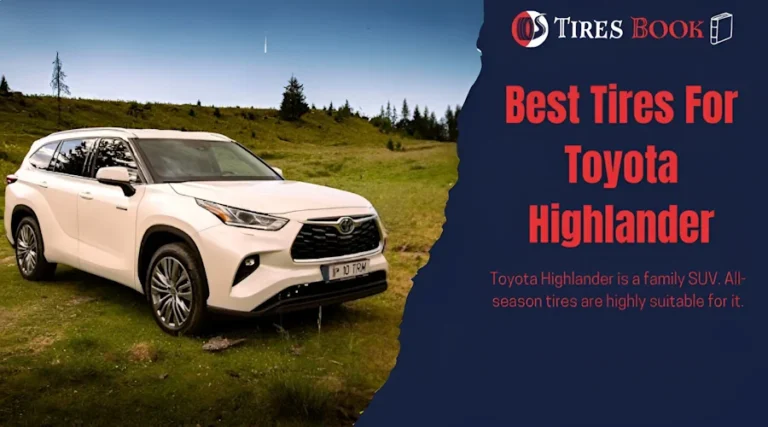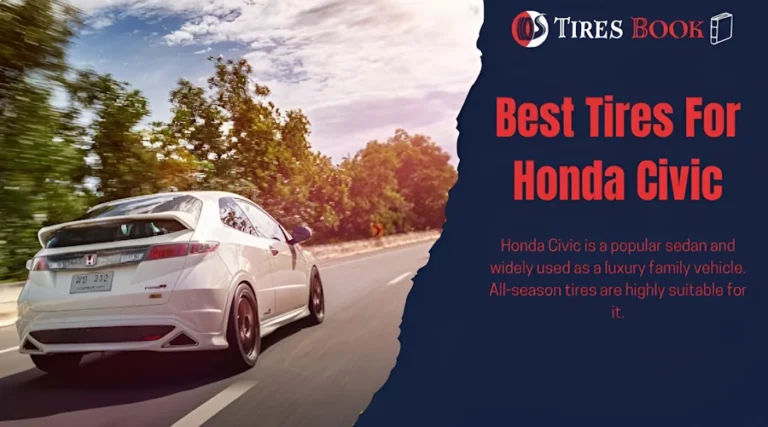In the quest for the best tires for Toyota 4Runner, it’s important to consider how these tires can enhance the vehicle’s inherent strengths. The suitable 4Runner tires are those that complement its off-road prowess while maintaining comfort and stability for everyday use.
The Toyota 4Runner, a stalwart in the SUV market, has been a popular choice for consumers due to its exceptional reliability, robust mechanics, and unparalleled off-road ability.
The secret to its versatility lies in its tires. Whether you’re a camping enthusiast or a mountain lover, the 4Runner’s ability to accommodate a range of tires, from touring all-season to mud-terrain and all-terrain, ensures a tailored driving experience.
However, the decision doesn’t end at the point of purchase. With the 4Runner’s various trim levels, the opportunity for customization is vast.
Table of Contents
Details of the 9 Best Toyota 4Runner Tires for 2024
1. Falken WildPeak A/T Trail
Falken WildPeak A/T Trail is our top pick for for SUVs and crossovers. It is designed to provide comfort on the road while also boasts light off-road capabilities. It comes with a generous 5-year or 65,000-mile warranty and a 30-day or 1,000-mile trial ride.
Pros
Cons
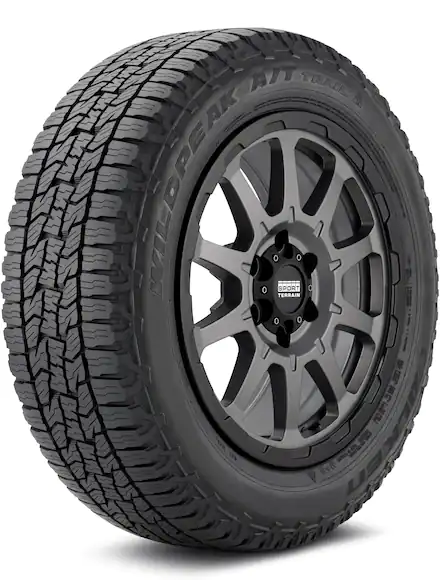
Overall Rating
| Treadwear | 9.0 |
| Dry & Wet Traction | 9.0 |
| Off-Road Performance | 9.2 |
| Winter Performance | 8.6 |
| Noise and Comfort | 8.3 |
| Price | 8.9 |
Our Verdict
Falken WildPeak A/T Trail features a silica-enriched compound and a purposeful, symmetric pattern for excellent traction and durability.
One of its standout features is the 3D Canyon sipes, which enhance snow traction, giving you superior grip and stability in wintry conditions. And thanks to its Three-Peak Mountain Snowflake rating, you can trust the Falken WildPeak A/T Trail to perform exceptionally in deep snow.
The Falken WildPeak A/T Trail's rugged construction and over-the-shoulder ribs are designed to resist punctures from rocks and sticks, making it an ideal choice for those who enjoy navigating rocky terrains or driving in snowstorms.
Some users have reported average performance on wet roads and potential hydroplaning in rainy conditions. Despite these observations, the tire's overall durability, comfortable drive, and puncture-resistant features continue to make it a popular choice among adventurous drivers.
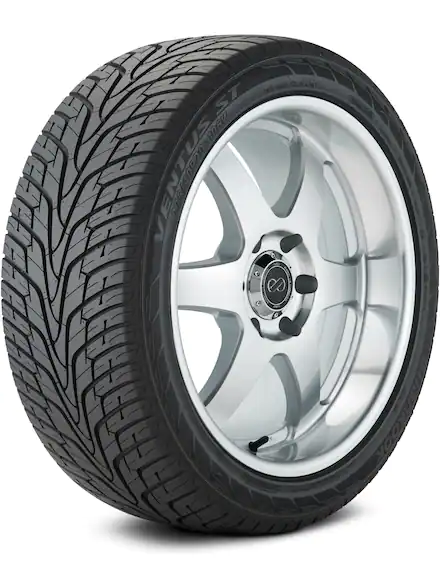
2. Hankook Ventus ST RH06
Hankook Ventus ST RH06 is a top-notch all-season tire for your Toyota 4Runner, especially if you're seeking a tire that delivers consistent performance in various conditions. With a warranty of 6 years or 50,000 miles, the Ventus ST RH06 offers a reliable solution for your SUV.
Overall Rating
| Treadwear | 9.0 |
| Dry Traction | 9.4 |
| Wet Traction | 9.1 |
| Winter Performance | 7.8 |
| Noise and Comfort | 9.1 |
| Price | 8.8 |
Pros
Cons
Our Verdict
Hankook Ventus ST RH06 tire stands out with its unique V-shape directional design, a feature that significantly enhances handling and traction on both dry and wet roads.
I have found that its dry traction is particularly impressive, giving you the confidence to navigate any route. While its wet traction is commendable, it may start to decrease after 25,000 miles.
Customer feedback on the Hankook Ventus ST RH06's tread life varies. Some users mentioned that Hankook should provide a longer warranty than 50,000 miles on this tire. However, the general consensus leans towards satisfaction with the tire's longevity. Despite some mixed opinions, most users appreciate the tire's durable performance over time.
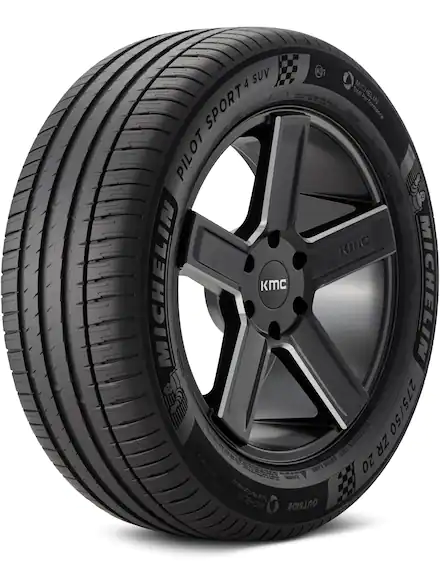
3. Michelin Pilot Sport 4 SUV
Michelin Pilot Sport 4 SUV is a high-performance summer tire designed specifically for powerful, performance-oriented SUVs and crossovers like Toyota 4Runner. Speaking of warranty, the Michelin Pilot Sport 4 SUV comes with a 6-year or 20,000-mile warranty, along with a 60-day satisfaction guarantee.
Overall Rating
| Treadwear | 7.0 |
| Dry Traction | 9.6 |
| Wet Traction | 9.5 |
| Noise and Comfort | 9.0 |
| Price | 8.3 |
Pros
Cons
Our Verdict
Michelin Pilot Sport 4 SUV is a summer superstar. It shines in dry, wet, and heavy monsoon conditions, thanks to its summer-focused tread compound and thin silica layer. These features enhance traction, making your drive smooth and controlled. Its asymmetric pattern further boosts its performance, adding a touch of charm.
However, remember that this tire isn't winter-friendly. Using it in cold conditions could lead to cracking, which isn't covered under warranty as it's considered misuse.
Based on customer feedback, the Michelin Pilot Sport 4 SUV has earned a favorable reputation among drivers. Users commend its exceptional traction in both dry and wet conditions, its firm grip, and its reliable handling, even in intense heat. However, I also noted a relatively faster wear rate. Despite this, the overall sentiment remains positive, with many appreciating the tire's performance-oriented features.
While the treadwear warranty might seem short, it's standard for a high-performance summer tire.
Michelin Pilot Sport 4 SUV Alternative
Given that Michelin tires come with a premium price tag, they might not fit everyone’s budget. You can also consider the General Grabber UHP, an excellent summer tire for SUVs that’s more budget-friendly than the Michelin Pilot Sport SUV.
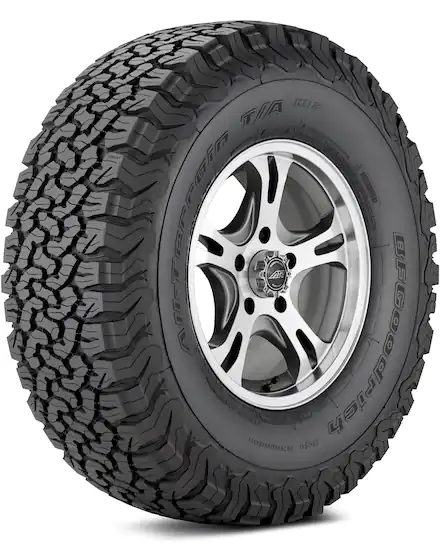
4. BFGoodrich All-Terrain T/A KO2
For those who own a jeep or SUV and crave off-road adventures, the BFGoodrich All-Terrain T/A KO2 is a fantastic choice. BFGoodrich offers a 50,000-mile treadwear warranty and a 60-day satisfaction guarantee for this tire.
Overall Rating
| Treadwear | 8.9 |
| Dry & Wet Traction | 8.9 |
| Off-Road Performance | 9.4 |
| Winter Performance | 8.8 |
| Noise and Comfort | 8.3 |
| Price | 8.6 |
Pros
Cons
Our Verdict
BFGoodrich All-Terrain T/A KO2 is designed to handle heavy-duty tasks, thanks to its high load-carrying capacity and increased inflation pressure limits.
Its tread compound is resistant to cuts, chips, and tears, and features interlocking tread blocks for a firm grip on various rough surfaces, including gravel, snow, mud, and rocks.
It also carries a severe snow service certification and the three-peak mountain snowflake (3PMSF) symbol, indicating its reliability in snowy conditions.
However, when purchasing the KO2, make sure to check the "DT" labeled tires, which use a different tread compound and lack the 3PMSF symbol. If you want optimal performance in winter, always opt for the tire with the 3PMSF symbol.
The BFGoodrich All-Terrain T/A KO2 is celebrated for its exceptional durability and off-road traction. Users have noted minimal treadwear even after extensive off-road use. While it's primarily designed for rough terrains, this may compromise on-road comfort. The ride might feel a bit stiff on highways due to the tire's rigid sidewall, a common trait among all-terrain tires.
However, this stiff sidewall also contributes to its high resistance to punctures. Some users have reported average performance on wet surfaces. In short, this tire is for off-road use, not for highways and city roads.
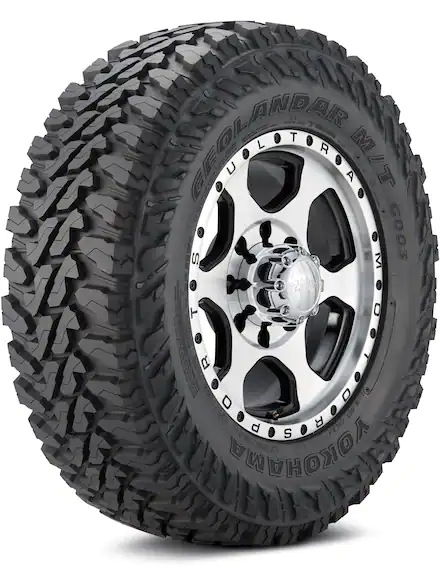
5. Yokohama Geolandar M/T G003
If you're seeking a tire that thrives in the most challenging conditions, Yokohama Geolandar M/T G003 is our top pick. Yokohama Geolandar M/T G003 comes with a 30-day test drive
Overall Rating
| Treadwear | 9.0 |
| Dry & Wet Traction | 8.8 |
| Off-Road (Specially Mud & Rocks) | 9.8 |
| Winter Performance | 8.3 |
| Noise and Comfort | 8.0 |
| Price | 8.4 |
Pros
Cons
Our Verdict
This Off-Road Maximum Traction tire is specifically designed to conquer muddy terrains, but it also performs commendably on rocks, mountains, gravel, and in both light and deep snow.
What sets this tire apart? It features an aggressive tread pattern with large gaps between treads, ensuring ultimate grip and control on muddy and rocky terrains.
Additionally, its thick sidewall is equipped with tread blocks that resist punctures and rough rides on both loose and hard surfaces. However, these tires aren't ideal for smooth highway cruises as they can be noisy and provide a stiff ride due to their thick and hard sidewalls. They bear the M + S symbol, indicating suitability for mud and light snow.
Yokohama Geolandar M/T G003 is a favorite choice of adventurers. They have expressed high level of satisfaction with its long tread life and its exceptional durability in terrain like deep mud and sharp rocks. Most users reported to achieve 35,000-40,000 miles with this tire. There have been no reported complaints about it so far.
Read our full Yokohama Geolandar M/T G003 Review
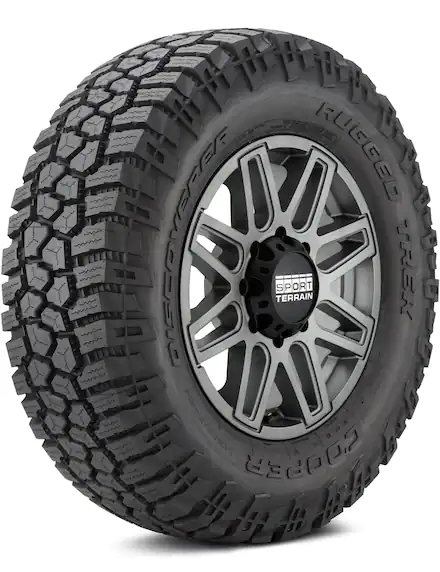
6. Cooper Discoverer Rugged Trek
The Cooper Discoverer Rugged Trek is a reliable all-terrain tire that excels in various terrains. Cooper Discoverer Rugged Trek comes with a 6-year/60,000-mile warranty and a 45-day road test trial
Overall Rating
| Treadwear | 8.8 |
| Dry & Wet Traction | 8.7 |
| Off-Road (Specially Rocks) | 9.0 |
| Winter Performance | 8.4 |
| Noise and Comfort | 8.5 |
| Price | 8.6 |
Pros
Cons
Our Verdict
Not only does Cooper Discoverer Rugged Trek performs well on almost all surfaces, it also carries the severe snow service certification and the three-peak mountain snowflake symbol. This certification attests to its capability in challenging winter conditions.
It’s particularly recommended for rugged, rocky mountains, and rough tracks due to its durable construction and cut-and-chip resistance.
Users have praised the Cooper Discoverer Rugged Trek for its exceptional grip on snow, wet, rocky, and muddy terrains, attributing this performance to its aggressive tread design.
However, this same design can lead to some noise, which may be a concern for some drivers. Despite this, the tire’s excellent traction across various terrains and its standout performance in mountainous snow conditions make it a trusted choice for many.
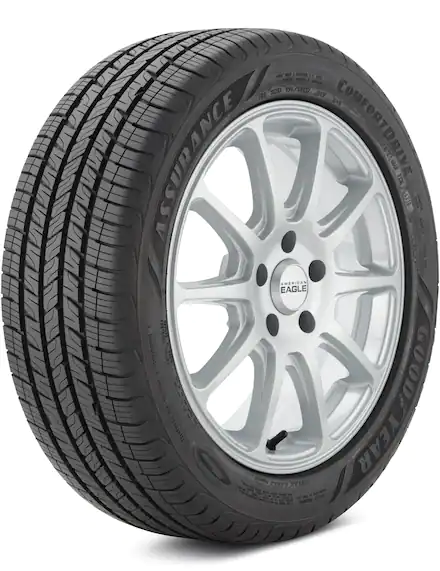
7. Goodyear Assurance ComfortDrive
If smooth and comfortable ride is your priority, Goodyear Assurance ComfortDrive can provide a luxurious driving experience. The Assurance ComfortDrive tire from Goodyear has a 6-year/60,000-mile warranty and a 30-day test drive.
Overall Rating
| Treadwear | 8.9 |
| Dry Traction | 9.0 |
| Wet Traction | 8.8 |
| Winter Performance | 8.2 |
| Noise and Comfort | 8.7 |
| Price | 9.2 |
Pros
Cons
Our Verdict
Goodyear Assurance ComfortDrive has optimized tread pattern that is specifically designed to minimize tread and airborne noise, resulting in a luxuriously quiet ride.
Symmetrically balanced AquaChannel Grooves and large lateral notches aid in water evacuation from the contact patch and increase resistance to hydroplaning.
Environment-friendly things always catch my attention and this is the case with Goodyear Assurance ComfortDrive. Incorporating soybean oil, the tire features a tread compound that enhances grip in low temperatures while maintaining fuel economy and tread wear. It's engineered to deliver a satisfying grip on both dry and wet roads, and it performs confidently in wintry weather conditions, including light snow.
Drivers praise its on-road capabilities as well as light snow traction. However, as the tires wear, typically after 15,000 to 20,000 miles of driving, some users have noticed a little increase in noise. Despite this, they continue to excel in absorbing shocks from bumps, contributing to smoother overall ride quality.
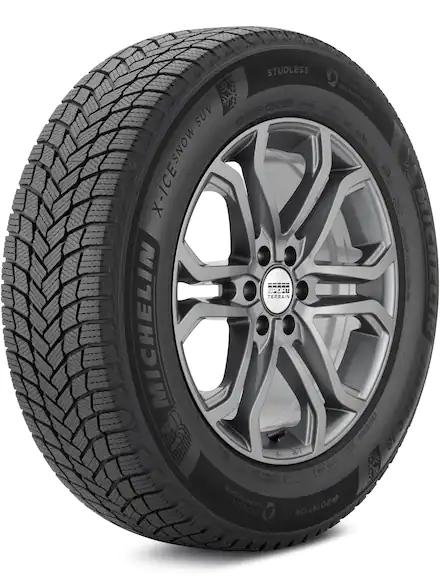
8. Michelin X-Ice Snow SUV
The Michelin X-Ice Snow SUV is a winter tire that's specifically designed for SUVs, providing excellent performance in the harshest winter conditions. In terms of warranty, Michelin offers a 6-year or 40,000-mile warranty. Additionally, it offers a 60-day satisfaction guarantee.
Overall Rating
| Treadwear | 9.0 |
| Dry Traction | 8.9 |
| Wet Traction | 9.2 |
| Winter Performance | 9.5 |
| Noise and Comfort | 9.0 |
| Price | 8.2 |
Pros
Cons
Our Verdict
Michelin X-Ice Snow SUV is your reliable partner in winter, whether you're driving on wet, icy, or snow-covered roads. It's designed to deliver the stability and traction you need to navigate safely through winter weather. I recommend using these tires in sets of four to maximize their handling characteristics and overall performance.
Its unique FLEX-ICE™ 2.0 Inclusion Technology creates micro-roughness on the tread surface, enhancing grip on icy and snowy roads. This tire is not just about grip, it's also about durability, thanks to its high silica compound.
On the whole, the customer sentiment towards these tires is overwhelmingly positive, demonstrating their effectiveness and reliability during the winter months. Any negative feedback from customers is likely not a reflection of the tire's performance, but rather a result of inappropriate usage.
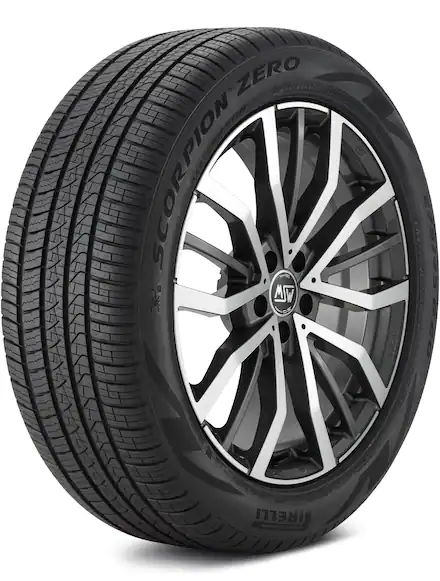
9. Pirelli Scorpion Zero All Season Run Flat
The Pirelli Scorpion Zero All Season Run Flat is one of the best run-flat tires designed for all-season use, making it an excellent choice for Toyota 4Runner owners and other SUVs.
Overall Rating
| Treadwear | 8.5 |
| Dry Traction | 9.2 |
| Wet Traction | 8.8 |
| Winter Performance | 7.4 |
| Noise and Comfort | 8.4 |
| Price | 8.3 |
Pros
Cons
Our Verdict
Pirelli Scorpion Zero All Season Run Flat provides reliable run-flat ability up to 50 miles in case of a puncture or complete air loss. These tires are known for their impressive grip and traction on both wet and dry surfaces.
Pirelli Scorpion Zero All Season Run Flat tires are engineered with high sipe density, providing excellent grip and traction in winter conditions. They also feature Pirelli's Noise Cancelling System, which reduces cabin noise for a quieter, more comfortable ride. Furthermore, the tires have four longitudinal grooves for excellent water expulsion and lateral stability.
Reviews collected from verified drivers show mixed opinions. Some users commend the long-lasting tread, while others express concerns about premature wear. It's important to note that these are not all-terrain. Therefore, if your driving is primarily on rough terrains, a shorter lifespan should be expected.
How Do We Select the Best Tires?
We don’t just pick the tires randomly. There is a lot of work behind suggesting the lists of the best possible tires for readers and buyers. We adopt a multi-dimensional approach rather than just a 'single person experience'. Our lists and reviews are a collective wisdom of many users rather than a single user.
To determine the best tires, we undertake extensive market research, meticulously examine the specifications of each tire, and carry out a very thorough analysis of user reviews from top retailers. Finally, our keen tire experts apply their experience and expertise and provide a well-rounded assessment to create the final list of the best possible tires. Read our detailed review process.
What Factors Should You Consider When Purchasing a Tire For Toyota 4Runner?
When selecting a tire for your Toyota 4Runner, consider the following factors:
Wheel Size
The wheel size of your vehicle is crucial in determining the right tire. Tires are designed to fit specific wheel diameters, so it's important to match the tire size with your vehicle's wheel size.
Weather and Seasons
Depending on the climate you live in and the seasons you drive in, different tires may be more suitable. For example, all-season tires for SUVs are good for mild climates throughout the year, while winter tires are necessary for areas with heavy snow.
Terrain
The type of terrain you frequently drive on also affects your tire choice. On-road all-terrain tires are designed for both on-road and off-road driving, while highway tires are best for paved roads. Similarly, off-road all-terrain tires are for the toughest of the surfaces like mud and rocks. They are not comfortable for driving on paved roads due to their stiff sidewall.
Driving Habits
Your driving habits, such as whether you drive aggressively or conservatively, can influence the type of tire you need. High-performance tires are suited for aggressive driving while touring tires are better for a smooth and comfortable ride.
Dry and Wet Traction
Good dry and wet traction is essential for safe driving. Tires with excellent traction can grip the road better, improving your vehicle's handling and braking performance.
Is It Necessary To Stick With the Original Tires On a Toyota 4Runner?
Absolutely not! The tires that come with your 4Runner from the factory are generally designed for average driving conditions. However, your specific driving habits or the weather you frequently encounter may necessitate a different type of tire. For instance, if you often venture off-road, you might need tires with better off-road traction and durability.
Conversely, if you're primarily driving on highways, you might want tires that prioritize fuel efficiency. Ultimately, it's about finding the tires that best suit your individual needs and driving style.
Frequently Asked Questions (FAQs)
Conclusion: What Should Be Your Choice?
Selecting the appropriate tire for your Toyota 4Runner can greatly improve your driving journey. It's essential to take into account the typical weather conditions and terrains you drive on, your personal driving style, and the seasons in which you most frequently use your vehicle.
If you're looking for the best overall tire that offers a balance of performance across various conditions and terrains, the Falken WildPeak A/T Trail won't disappoint.
The Hankook Ventus ST RH06 is the best all-season option for your 4Runner that provides exceptional handling and braking capability on both dry and wet surfaces.
If you're an off-road enthusiast, We would recommend the BFGoodrich All-Terrain T/A KO2 which offers top-notch traction on a variety of tough terrains.
For extreme winter and summer conditions, the Michelin X-Ice Snow SUV and Michelin Pilot Sport 4 SUV are excellent choices respectively.
Remember, the right tire not only ensures a smooth ride but also contributes to your vehicle's fuel efficiency and safety. Happy driving!

